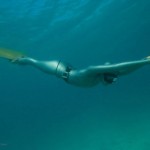 Just a thought that occurred to me while thinking about athletes I trained for the recent International competition in Greece. Belief is an essential element in mental preparation. Belief is distinct from faith.
Just a thought that occurred to me while thinking about athletes I trained for the recent International competition in Greece. Belief is an essential element in mental preparation. Belief is distinct from faith.
I remember in one of the first Competitions, in either Sardinia or Nice, an Israeli competitor had a Blackout in a CWT (Constant Weight) dive. When we were analysing together what went wrong, it emerged that during the warm ups before his dive which had been declared at 47mts, he did a warm up to over 40mts. This was an extraordinary lack of belief in himself, he needed to prove to himself NOW that he could do his dive. Two dives with a short interval close to his maximum were not likely to produce a good result!
First, lets distinguish between what I mean by faith and belief. Faith is when
a diver in competition reasons I am going to declare 80mts in CWT, the most he has ever done is 70mts , but he is incredibly motivated and reasons â€I have better safety than I had in training, the pressure increments are small, and either I get it or I don’t“. Usually, but admittedly not always, the results are a red card. However a severe black out is something that can destroy confidence, and leave a mental scar.Belief on the other hand is something much more reasoned, it is not “belief in oneself“, belief in oneself is too big a parcel, all of us have weaknesses and strengths, its not particularly productive to meditate on this and try to do an accounting of plusses and minuses. I try to explain it this way it’s a belief in body memory as if your body is a wise other entity. It will remember even if you have doubts.
If you hav’nt ridden a bicycle for 5 years, you might chose a safe place, not just safe from traffic but safe from the eyes of family and neighbours, but in seconds you are riding as if you never stopped. Your body remembers!
The building of the basis for belief is in logical and methodical training. It’s the hours you put in taking the dive down into its component parts and training each element separately, working on one’s weaknesses, so that when the opportunity occurs to put it all together in a period of deep water training, there are very few surprises and a logical plan of how to progress.
When it comes to deep water training, you have to look at what might stop you; equalisation, inurement to pressure. Ok, these can be trained by FRC and empty lung dives and should have been trained before the start of deep water training. But now we have a new element that comes into the equation – time, FRC and empty lung dives are much shorter, now we have pressure + time. The challenge is to remain totally relaxed and this implies belief in one’s well trained breathold and ability to relax.
The building of belief depends as far as possible eliminating surprises, you have two weeks to train depth you have done 50 mts CNF. How long ago? At what depth do I begin how do I divide the two weeks between time taken to return to 50mts, and how many days to progress beyond this? What increments are feasible? What is a feasible ultimate objective?
In our freediving courses ,we watch students faced with a new depth taking longer and longer to ventilate before their dive, this is lack of belief. In fact what their actions are saying is “I am not ready, I need more time more air!â€. Actually, it takes only very few breaths to hyper saturate with O2, and the speed of achieving relaxation is a question of habit, it can be trained. Belief responds to methodical realisable incremental and regular progression.
A final word to competitors, when considering what to declare, dive your dive let others play the tactical games and fail. This is the recipe for success.
Absolutelly true! In March this year, in a competition in Dahab, a day before The dive – I couldn’t do it. But when I heared the “5, 4, 3, 2, 1, official top, 1, 2, 3” I did it. and it was my best dive ever! Thanks to what I was thinking before the dive!